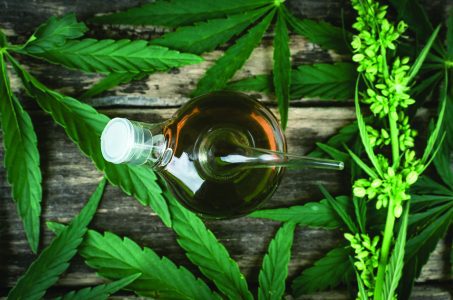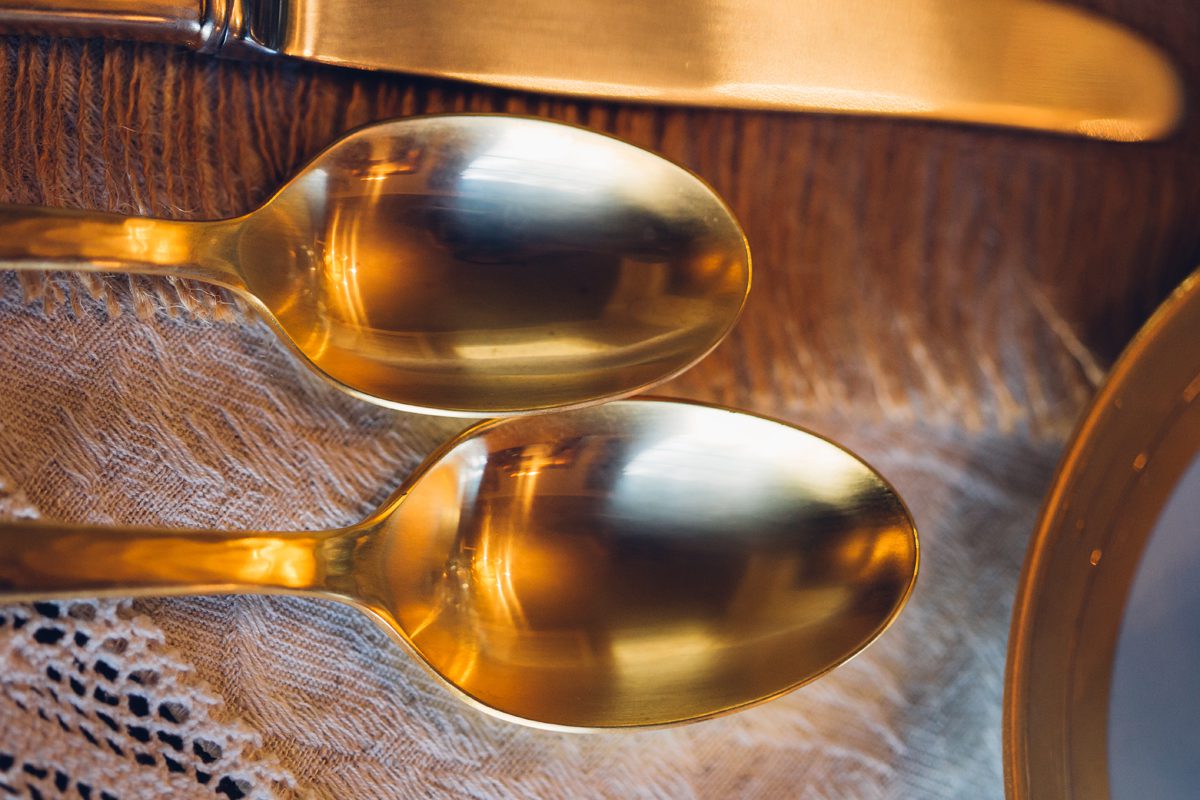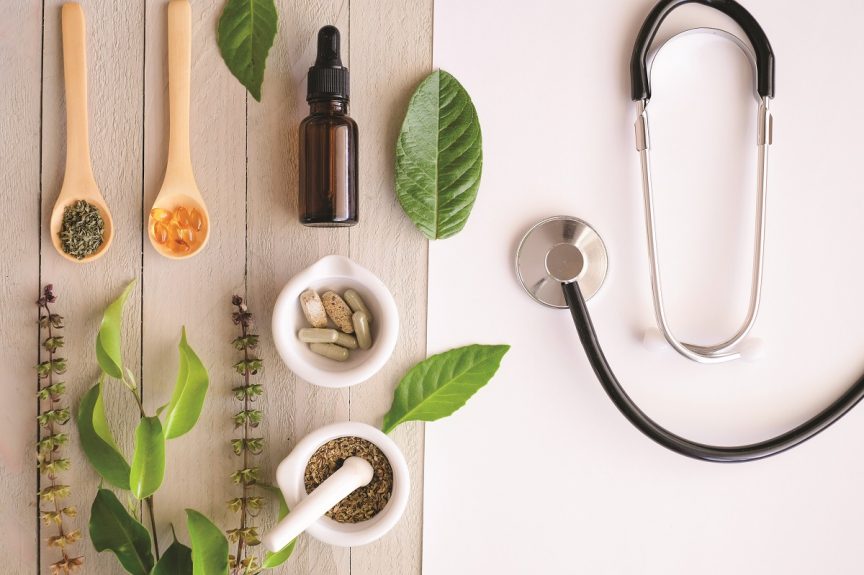On December 20, 2018, President Trump signed into law the 2018 Farm Bill, legalizing hemp. This bill now amends the Controlled Substances Act of 1970 to remove hemp from the definition of marijuana and to subsequently open the doors to research and production. It is now deemed an agricultural commodity. Recall the history of greater than 8,000 years of continuous use of hemp in the world. Hemp was either grown and/or used by Cleopatra, Pliny The Elder, Queen Elizabeth, George Washington, Thomas Jefferson and others. Staying informed and deciding what’s best for you relative to hemp is vital, as politics and medicine catch up with nature.
So, let’s get enlightened!
Cannabidiol (CBD) is one of over 80 chemical compounds found in the Cannabis Sativa plant called cannabinoids. Cannabis plants grown specifically to have a high CBD to THC ratio are called hemp, whereas plants with more THC can be classified as marijuana. CBD products are legal in all 50 states if they are derived from an industrial hemp. CBD is not psychoactive, meaning it doesn’t make you “high.” Tetrahydrocannabinol (THC) is the compound in cannabis that has psychoactive effects. In the United States, CBD is considered a dietary supplement if it’s made from industrial hemp plants. Some CBD products do contain a mix of CBD and THC, but there are plenty available that contain hardly any THC. When CBD is derived from hemp plants it generally has a THC level of 0.3% or less.
Full spectrum hemp contains a wider array of the CBD compounds, making the product very beneficial, thus preferable. An isolate of CBD is still valuable, but when you take full-spectrum CBD or whole plant CBD, it’s far more potent. A full-spectrum CBD contains CBDA, CBG, CBGA, CBC and CBCA.
This all sounds unbelievable that a product derived from a plant, the Cannabis Sativa plant can address so many disorders / diseases of the body. But once you understand the endocannabinoid system (ECS), it makes clinical sense. The ECS was discovered in 1990 by Dr. Ralph Mechoulam. To maintain stability and health, the human body naturally produces compounds called endocannabinoids. They are responsible for homeostasis, i.e., regulation of following: breathing, body temperature, inflammation, immune response, mood, pain, GI motility, neuroprotection, hormonal balance, reproduction, sleep/wake cycle, blood pressure and tumor surveillance. Our body can easily get out of balance when it doesn’t produce sufficient endocannabinoids. That deficiency can cause severe pain/discomfort and many illnesses and diseases. When cannabinoids are absorbed into our system, they can imitate the compounds that our bodies naturally produce (endocannabinoids); and provide relief to numerous symptoms that our bodies commonly experience: inflammation, pain, nausea, anxiety and others.
Dr. Mechoulam discovered two main receptors in the body: cannabinoid 1 (CB1) and cannabinoid 2 (CB2). Each of us has our own endocannabinoid system (ECS), with cannabinoid receptors or CB receptors (CB1 and CB2) in the brain and throughout the body, which respond to CBD (and THC). And, it is CBD stimulation of our CB receptors that results in all the benefits including an increase in metabolism and the shrinking of fat cells. CB1 receptors are primarily found in the brain and when activated, play a role in memory processing, motor control and pain regulation. THC binds to CB1 receptors, where the “high” feeling comes from. CB2 receptors are found in the periphery, and primarily in the immune system. Thus, when CBD binds to the CB2 receptors, it produces anti-inflammatory effects.
The therapeutic effects of CBD are more pronounced when combined with other cannabinoids and chemical compounds, i.e., Terpenes in what is coined the “Entourage Effect.” The Entourage Effect is defined as the synergy of different compounds, which produce effects that would not be felt by the individual compounds alone. CBD is rapidly gaining popularity as a safe wellness and medical aid that offers similar benefits to prescription drugs, without the negative side effects. With this increasing demand for CBD, there are a plethora of companies in existence. Thus, the purchaser must become knowledgeable about making appropriate decisions on the sourcing of the product. If unsure, it would be prudent to align oneself with a healthcare provider versed in the evidence-based science of this beneficial oil, CBD.


A final note to seriously consider before buying and using hemp-derived CBD oil is the potential for what is termed False Positive (finding THC) results on an inexpensive immunoassay urine and/or saliva drug screen. It is unlikely but possible, based on variations of individual metabolism. Here again is the critical importance of choosing an appropriate, high quality product. And, if False Positive results occur, one should ask for more sophisticated testing through serum or hair analysis. Having a documented letter in place by a healthcare provider would be exercising prudence.
If one is interested in making the decision to use hemp-derived CBD oil and having a letter, reach out to a knowledgeable healthcare provider. After spending significant research time on this article and the resource contacts that are possessed, I may be a good first step in helping you to make sound decisions regarding the acquisition of high quality hemp-derived CBD oil.
Benefits of a Full Spectrum CBD product include:
- Lower inflammation levels, i.e., anti-inflammatory
(most diseases stem from inflammation)
• Anti-bacterial
• Pain-relief, i.e., analgesia
• Possible inhibition of cancer growth, i.e., anti-cancer
• Improved sleep quality, i.e., anti-insomnia
• Lower anxiety levels and depression, i.e., anxiolytic /
anti-depressant
• Relief for post-traumatic stress disorder (PTSD) • Possible relief from seizures, i.e., anti-epileptic and
relief from spasms, i.e., anti-spasmodic
• Promotes healthy blood sugar and insulin levels
• Contributes to healthier cholesterol levels, thus
contributing to the decrease in plaque formation…
heart disease.
• Supports the health of the gastro-intestinal tract,
thus controlling nausea, vomiting and inflammatory
disorders, e.g., Crohn’s Disease and Irritable Bowel
Syndrome (IBS)
• Aids in managing skin disorders, i.e., acne, psoriasis
and others
• Helps to control ophthalmic issues like glaucoma • Addresses osteoporosis by stimulating new bone
formation
• Involved in reproductive and sexual health • Weight management, i.e., weight loss and appetite
control, depending on how your body reacts to CBD
An informed healthcare provider should be able to determine for a potential CBD Oil buyer the following criteria:
1.The reputation of the company. Does it possess stellar quality control standards and outstanding customer support? Have they received a warning letter from the FDA about the marketing of their
products?
2.Where does the company source the hemp derived CBD? Is it in the United States; and is it extracted from the flower and/or leaves?
3.Does the company practice authentic third party testing? This will determine the actual concentration/potency; confirm full spectrum CBD; how it is released from the plant, i.e., cold press vs. supercritical CO2 extraction; and any contaminants, i.e., pesticides, herbicides, harmful solvents/chemicals, bacteria, mold and fungus like Aspergillus.
4.What are the various forms that the product can come in? Here is a list: tinctures/drops, softgels, capsules, sprays, lozenges, topical creams and salves, edibles, beverages, infused in food including spices and more. The delivery method is a personal preference. Speaking of preferences, vaporizing is another option. Vaporizing doesn’t burn the flower the way smoking does. Smoking releases toxins like in cigarettes. The “pros” in general, vaping is a cleaner, more discreet way than smoking to deliver the cannabinoids. The downside of vaping is that the oil may contain harmful residual solvents depending on the extraction process.
5.How is the CBD oil dosed in children and adults, based on current research, which also takes into account the ailment one is looking to treat?


Dr. Karen and Dr. Jack
Co-Founder/CEO of the concierge Lifestyle Medicine practice: Pair O’ Docs Bio-Rejuvenis. Affiliate, FitnessGenes Pro. earned a Doctor of Medicine degree from Tulane University School of Medicine; and completed Ophthalmology Residency and Fellowship training in Cornea and Refractive Surgery at the LSU Eye Center, both institutes in New Orleans, LA. Received continuing education from Tulane’s Institute for Culinary Medicine and the Institute for Integrative Nutrition. Our passion is for patient education at the individual and community levels. We take a comprehensive approach to patient care, concentrating on the management of metabolic and hormonal imbalances; correction of nutritional deficits; and tailoring exercise physiology. We also encourage each patient, their families and our communities to achieve health, personal fulfillment and the goal-attainment of “Be Healthy…Look Better…Perform Well.
DISCLAIMER: The information presented here is for educational purposes only. It is not intended or implied to be a substitute for the diagnosis, treatment, or advice of a qualified, licensed medical professional. You are encouraged to confirm any information obtained from or through this article with other sources and review all information regarding any medical condition or treatment with your physician.








